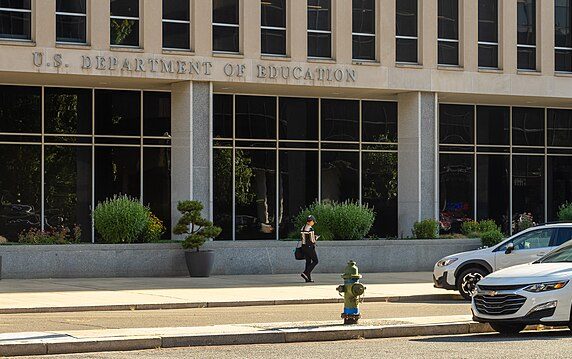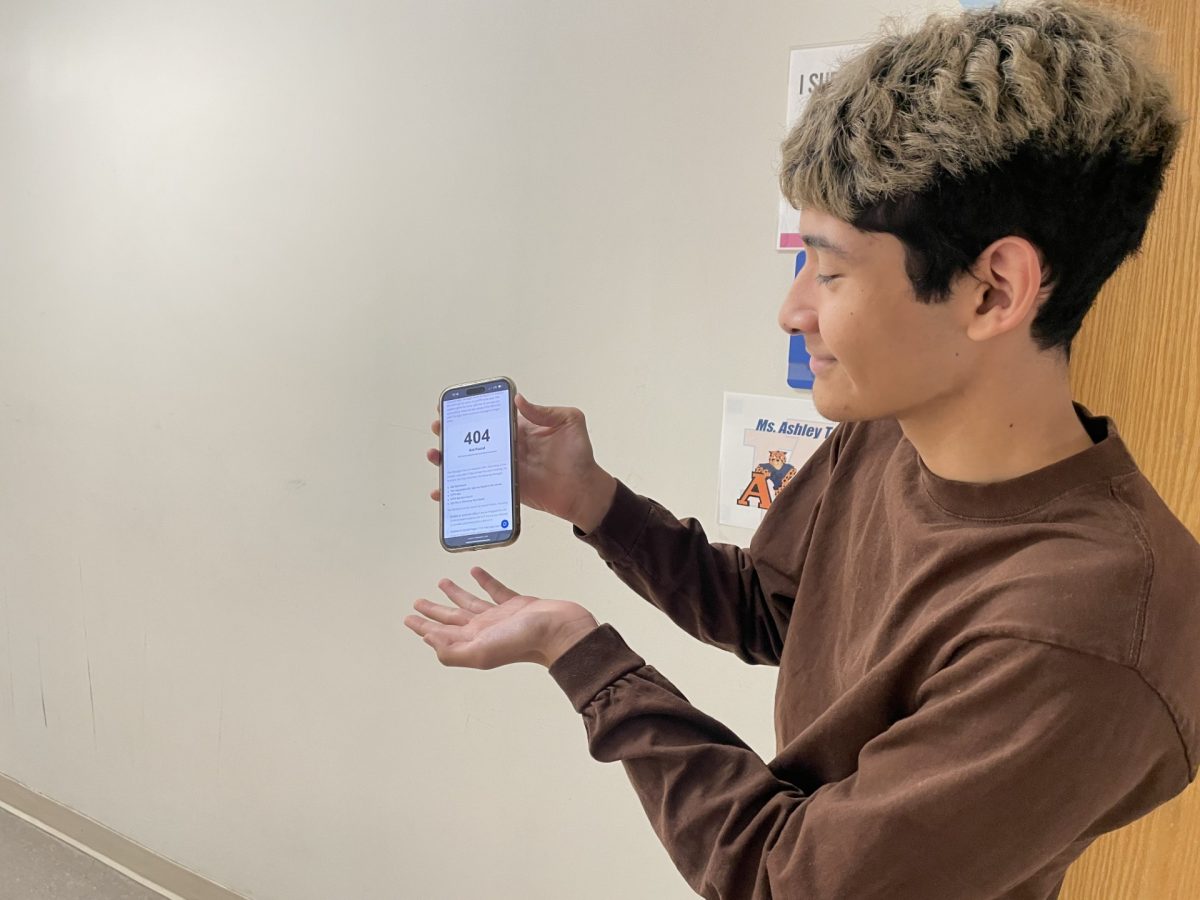The impact of President Trump’s policies, 85 days in

Since being inaugurated after his victory in the 2024 presidential election, President Donald Trump has embarked on a wide range of swift and controversial actions, from dismantling the Department of Education, to gutting funds to schools and government agencies and implementing widespread tariffs on America’s trading partners. These actions have been taken in the name of reducing federal spending, stifling diversity programs and increasing American manufacturing. Critics warn that these actions could lead to the shuttering of important government programs that people rely on, and could damage America’s already inflating economy, leading to greatly increased prices for everyone.

President Donald Trump signed an executive order Mar. 20 ordering for the closure of the Department of Education, citing a wish to reduce federal spending, stifle equity programs and give states more power. He fired roughly half of its staff Mar. 13th, and has further vowed to dismantle the department in its entirety. The Education Department manages and provides many different programs, all of which could be at risk if it is closed: federal student loans for college students, special education programs, the enforcement of civil rights in schools, CTE classes and funding for many schools and school districts.
“A little less than 10% of the WCPSS budget comes from federal funds,” said Lynn Edmonds, Wake County School Board Member for District 5, the district which represents Athens. “That may not sound like much, but it’s important to understand that those dollars are for critical needs: school meals, special education, magnet programs, and more.”
The Department of Education helps with many things at schools across the country, including Athens. For example, here at Athens, it provides funding for school meals, and for CTE courses such as Foods, Film TV and Video Production, Drafting, and Animal Sciences. It also regulates civil rights within schools, manages federal student aid for students aspiring to go to college and provides necessary funding and grants to the school and teachers.
“Students are impacted because they benefit from these programs and services,” said Edmonds. “Students need access to school meals; they need special education services including the specialized teachers that work with these students. Our magnet programs offer school choice within WCPSS and provide students with special academic, arts and STEM programs.”
Of the many programs the Education Department provides, one major program at Athens is special education and accommodations for students. Individualized Education Programs (IEPs) & 504 Forms managed by the Education Department provide necessary accommodations for students with physical or mental disabilities that impact their learning. This goes alongside special education and Occupational Course of Study programs for the over 200,000 students in North Carolina who need them.
“The Department of Education guides you through how to help a student with a specific disability, how to give them the individualized education that they need,” said Morgan Thomas, special education teacher at Athens. “Without the Department of Education, they would not be receiving that individual aspect, students’ learning would stop, and they would be placed in classrooms that they shouldn’t necessarily be in.”
Despite these many programs and benefits for students, teachers and schools, Trump has repeatedly vilified the Department of Education as spending too much money, and has vowed to shut it down entirely and leave all of its programs up to the individual states to cover—a move that would require congressional approval. Aside from his executive order ordering for the department’s closure, he has already slashed grants to teachers, cut funds to the Institute of Education Sciences which researches and gathers data on education policy and academic progress, and fired half of the department’s staff, mostly affecting workers in charge of federal student aid and civil rights.
“If the US Department of Education is dissolved, we would have to look to the state legislature to fill those gaps. Over the last decade, the legislature has slashed our corporate tax rate (it is set to be fully eliminated by 2030) and prioritized tax breaks for North Carolina’s wealthiest residents,” Edmonds said. “This, in addition to their massive investment in private school vouchers, hurts public schools. While no state should have to take up funding provided by the U.S. Dept of Ed, NC will be in an extremely challenged position to do so.”
If Trump does manage to shut down the Department of Education, all of its programs are at risk of either shrinking to a smaller, ineffective size, or shutting down completely. The CTE courses at Athens may shrink or be entirely lost, special education and the school itself may lose necessary funds, federal student loans may no longer be available or may be harder to obtain and the future enforcement of civil rights in schools may be uncertain.
“I’m outraged at the potential shutdown of the US Dept of Ed. I think it’s short-sighted and cruel. I do not believe this administration cares about public education or public goods and services,” Edmonds said. “Students should contact their representatives in Congress, attend town halls, protests, etc. Make your voices heard!”
As President Trump’s term continues, his administration is working to fulfill their promises of cutting government spending and completely removing federal influence from education by dismantling the Department of Education. This may lead to multiple changes to how Athens Drive and other schools around the country are run, including possible budget cuts.
The Department of Education is a federal agency that oversees and provides funding for various government programs. It oversees student loan programs, assists in funding programs that support low-income and disabled students, and enforces civil rights laws designed to prevent race or sex-based discrimination in federally funded schools. Despite misconceptions, the department does not create curricula or operate schools. That responsibility belongs to the states.
Dismantling the Department of Education has been a longtime goal of conservatives, who have wanted to return the power of education back to the states and, more recently, have wanted to stop the department from pushing what they call a “woke” political ideology about gender and race onto children.
By himself, Trump can’t dismantle the department. Eliminating it would require a supermajority of 60/100 in the Senate, which is unlikely. To abolish the agency, 7 democrats would have to join all 53 republicans.
Despite this, the president has issued an executive order directing the Education Secretary Linda McMahon to “take all necessary steps to facilitate the closure” of the department, while also ordering her to ensure “the effective and uninterrupted delivery of services, programs, and benefits on which Americans rely,” according to the order.
Dismantling the department, along with other efforts by DOGE to cut government spending, may cause a decrease in funding for schools across the country, along with multiple policy changes. Specifically, CTE, special education, and school lunch programs are all at risk for federal spending cuts.
“All CTE classes in the state, I’d say most of them in the country are funded at the federal level, but the way that that happens is the federal government gives the school system money, the school system puts it into an account or fund, and then redistributes it,” said Edward Burt, Special Populations Coordinator (SPC) at Athens.
The impact the cuts might have on Athens itself are uncertain, though Burt doesn’t expect very much to happen on the school level.
“I tend to think that classroom teachers will be the last ones to be affected…I hope I don’t see any direct impact on the school level. But there is a trickle-down effect, from any kind of budget cuts,” said Burt.
Along with CTE, special education may be impacted as well. Like CTE, the exact effects remain unclear, but minor monetary cuts and policy changes are expected. Those policy changes could affect how money is allocated, which could shrink the program.
“The way that education works is that the federal government grants states funding depending on what requirements they meet, and in North Carolina, federal money accounts for, let’s say about 10% of the school’s overall budget. Maybe more or less depending on the school. That money can also be diverted to other funds like tutoring, intervention, career and technical education, and special ed,” said Michael Clinkscales, Assistant Principal of Special Education at Athens.
One of the risks for special education is the reduction of Instructional Assistants (IAs). IAs help out special education teachers by giving students extra help in areas where they might be struggling.
“We could lose some IAs to this. That’s part of the intervention strategies that could be impacted by the federal government. Again, it all depends on how the states want to use the money as they start to re-allocate,” said Clinkscales.
Losing IAs would have a profound impact on special education.
“[Special Education] teachers do a great job of teaching, but when those IAs are there, they make it even better. They work together as a whole team, so when the teacher may want to focus on these two the IA can focus on these other three, or vice versa. Or, if there’s a need for assessing a student because it’s time for an IEP review, the IA can cover the class while the main teacher, who’s certified to do that, can do all of the assessments. If that money does get reallocated and we lose IAs, it’s gonna be felt hard [by the department],” said Clinkscales.
Ultimately, the true effects that the cuts will have on schools remains unclear.
“In the end, if the constitution says education is part of the state’s responsibility, then we’re gonna have to figure out how to make it happen. So we’re waiting to see what those cuts actually impact,” said Clinkscales.
As news of Trump’s tariffs continue to spread, staff and students at Athens Drive High School are worried about what is going on with our economy. Several are questioning if his decision-making is helpful and making a change or just creating more problems.
“They backfired because stocks are going down, causing anxiety not only on stockholders but on citizens,” said Gianni Mancera, sophomore at Athens Drive. The decline in stock prices is having a continuous impact throughout the economy. This is affecting Europe, Canada, and the U.S. Trump officials have justified them as necessary to prevent illegal immigration and drug trafficking, and to put pressure on other countries. Tariffs are being put on goods that are brought in from Canada and into the U.S.
After Trump’s tariffs led to growing fears of a recession, he decided to issue a 90-day pause for most of them. Out of the 90-day pause, China was excluded from the exemption. The United States later increased tariffs on China to 125%, after retaliation from China with their own tariffs.
There is an ongoing war against tariffs between China and the U.S., which could cause “A future recession; this is the last thing the US needs,” said Mancera. Prices are continuing to increase, the opposite of what Trump imposed and said he would do. According to reporting from CNN, about half of Mexico’s trade, and 36% of Canada’s, is covered under the US-Canada-Mexico free trade agreement, and would not be tariffed. Many goods outside of this agreement will still be tariffed, leading to increased prices, and tensions. The increase in tension on trade could also ruin American industries.
”The shift from the Biden administration was felt immediately by me and a lot of the people I know, such as grocery prices, as well as the extreme downturn of the stock market,” said Tatum Shin, sophomore at Green Hope.
So far, many of these tariffs have been delayed until July 13, 2025. They could cause a future recession and increase the risk of a trade war. “Tariffs are meant to help businesses and products; they should support their national economy through cheaper prices,” said Shin. These prices are going to continue to increase throughout Trump’s administration.
“Tariffs are a back-and-forth game and promise that ‘products will be cheaper”…other countries will impose their tariffs on us for doing it first,” said Shin. Instead of achieving economic relief, the cycle of tariffs may ultimately hurt the very industries they aim to protect. “Tariffs are meant to help nationwide businesses and compete with foreign businesses by taking the foreign prices up and help spend less money, but that isn’t effective in the United States where manufacturing prices are so expensive,” said Shin about Trump’s decisions.
As the debate over Trump’s tariffs continues, concerns about their long-term impact remain. While intended to protect American businesses, the rising costs and economic uncertainty have many questioning whether these policies will help or hurt in the long run. With the possibility of a recession looming and tensions in global trade increasing, only time will tell if these tariffs will bring economic relief or further financial strain.
Since the start of Trump’s presidency, many people from various different backgrounds have been affected by and reacted to his actions. For example, Grassroots organizations like 50501 have organized nationwide protests, including a “Forward Together” protest held April 19. Many Raleigh and Cary residents joined in on these protests, with the local “Forward Together” protest being held at the Halifax Mall next to the Legislative Building.











